This is the last of our series on the Creed.
And in the Holy Spirit, the Lord, the Creator of life, Who proceeds from the Father, Who together with the Father and the Son is worshiped and glorified, Who spoke through the prophets.

Holy “Spirit“? The word “Spirit” makes Him seem like a kind of misty cloudy impersonal “stuff”. Formerly in English, the term “Holy Ghost” was used, which at least suggested a person of a sort, but it also has led to some confusion. Forgive me for including this, but I knew a boy in Sunday School who drew a picture of the Holy Ghost just like this! except that he did include a halo.
from fineartamerica.com
The word in Hebrew is רוּחַ, Ruach. In Greek it’s πνεῦμα, Pneuma (pronounced ‘pNEVma). They’re not adequate either, but both have a fuller meaning. Ruach and Pneuma both mean “spirit”, “breath”, “wind” – all of which create action without being seen. I used to do a simple teaching with our Church School children. I would have one of them hold up a lightweight sheet of paper, and then I’d blow on it. The Holy Spirit is like breath, air, wind – invisible, sometimes blowing mightily, sometimes scarcely at all, but always present. That is the Holy Spirit of God. But then He’s an invisible Person. How do we illustrate that?
The Holy Spirit in the Scriptures
Here are just a few examples out of a multitude:
 The Holy Spirit was present at the dawn of creation. The book of Genesis begins: “In the beginning God created the heavens and the earth. The earth was without form, and void; and darkness was on the face of the deep. And the Spirit of God was hovering over the face of the waters.”
The Holy Spirit was present at the dawn of creation. The book of Genesis begins: “In the beginning God created the heavens and the earth. The earth was without form, and void; and darkness was on the face of the deep. And the Spirit of God was hovering over the face of the waters.”
In the valley of dry bones, God said to Ezekiel: “Prophesy to the breath [Spirit], prophesy, son of man, and say to the breath, ‘Thus says the Lord God: “Come from the four winds, O breath, and breathe on these slain, that they may live.”’ ”So I prophesied as He commanded me, and breath came into them, and they lived, and stood upon their feet, an exceedingly great army. Ekekiel 37:9-10 The Holy Spirit is “the Lord, the Creator of Life“.
The Holy Spirit “spoke through the prophets.” Isaiah proclaimed “The Spirit of the Lord God is upon me, because the Lord has anointed Me to preach good news to the poor….” Isaiah 61:1
In the New Testament the Holy Spirit of God is mentioned far more frequently:
“How can I have a child while I have no husband?” The angel explained to the Virgin Mary: “The Holy Spirit will come upon you, and the power of the Highest will overshadow you…”
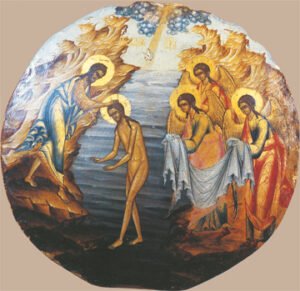 At Christ’s Baptism, “as He was praying, Heaven was opened and the Holy Spirit descended on Him in bodily form like a dove.” * Luke 3:21
At Christ’s Baptism, “as He was praying, Heaven was opened and the Holy Spirit descended on Him in bodily form like a dove.” * Luke 3:21
Russian, 18th c
- According to the Church’s best iconographic tradition, the Holy Spirit should be shown as a dove only in icons of the Theophany (Epiphany).
Christ began His public ministry in the synagogue in Nazareth by quoting Isaiah’s words: “The Spirit of the Lord is upon Me, because He has anointed Me.” Luke 4:18
On Pentecost, the Holy Spirit descended on the Apostles in the forms of a rushing mighty wind and of fire. Acts 2
The Holy Spirit is one of the Three Persons of the Holy Trinity.
 What would cause us to believe that? Not to be simplistic, but: “It’s because Jesus said so”. And also because in the Holy Scriptures, the Spirit is described in ways attributable only to God. *
What would cause us to believe that? Not to be simplistic, but: “It’s because Jesus said so”. And also because in the Holy Scriptures, the Spirit is described in ways attributable only to God. *
- Read a little book On the Holy Spirit by Saint Basil the Great, one of many books in the excellent “Popular Patristics” series published by Saint Vladimir’s Press.
Christ spoke of the Holy Spirit as a Person: “For if I do not go away, the Helper * will not come to you; but if I depart, I will send Him to you. And when He has come, He will convict the world of sin, and of righteousness, and of judgment…” John 16:7-8
- Paraklete / Comforter / Counselor / Advocate. There is no exact English equivalent for the Greek παράκλητος.
He placed the Holy Spirit on the same “level” as God the Father and God the Son: “Go therefore and make disciples of all the nations, baptizing them in the name of the Father and of the Son and of the Holy Spirit…” Matthew 28:19 This has been the Church’s form of Baptism from the beginning. *
- Oddly the Baptist Standard Confession of 1660 declared baptisms in the name of “Jesus Christ” to be valid – contrary to the Scriptures!
People sometimes ask “Which One should I pray to: Father? Son? Holy Spirit?” I heard Father Thomas Hopko say “Don’t worry about it. If you pray to One, you get them All”.
The Fateful Filioque
This is the phrase “and the Son” which has caused so much trouble. In traditional Western churchs it is inserted into the Creed, so that it says the Holy Spirit “proceeds from the Father and the Son“. This is not in the original and authentic wording of the Creed. The Orthodox objections:
1 It’s contrary to the Scriptures. Christ is “the only begotten of the Father”. John 1:14 “…the Spirit of truth who proceeds from the Father…” John 15:26
2 It violates the canons of the Third Ecumenical Council (AD 431) which specifically forbade and anathematized any who make additions to the Ecumenical Creed.
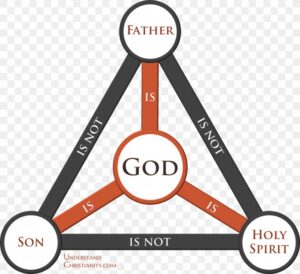
The Orthodox understanding:
3 The original and Orthodox Creed says the Father alone is the Source of all that is, including the Son and the Spirit.
The Western approach throws the understanding of the Holy Trinity “out of balance”. By “promoting” the Son to also be the Source of all, the Holy Spirit is effectively “demoted”, not given His proper place in the life of the Church. I think this explains why Western  Christianity has alternated between periods of dry theology and times of enthusiastic “Holy Spirit” movements – Protestant revivals, Pentecostal movements, the Catholic charismatic movement. After these settle down, then things go dry again till the next Spirit revival.
Christianity has alternated between periods of dry theology and times of enthusiastic “Holy Spirit” movements – Protestant revivals, Pentecostal movements, the Catholic charismatic movement. After these settle down, then things go dry again till the next Spirit revival.
The Western understanding.
In the Orthodox Church, the Holy Spirit remains integrated into the life of the Church. The chief outward sign is this: At Orthodox worship. almost all our prayers conclude with something like this: “For to You belong all glory, honor, and worship, to the Father and to the Son and to the Holy Spirit, now and forever and to the ages of ages.
If you want a brief but fuller discussion of the issue, you might search for: “Father Bill’s Orthodox Blog Post 56. Orthodoxy and Other Faiths: Roman Catholicism, Part Two”. However, far better and more thorough analyses can be found elsewhere.
Anyway, for a millenium the Filioque has been one of the chief causes of disunion between Orthodoxy and Western Christianity.
In one, holy, catholic, and apostolic Church.
Let’s take this first:
The Church is holy.
Father Alexander Schmemann wrote: “The Church is not an institution with sacraments. The Church is a Sacrament with institutions.”
Also, after a particularly hard day dealing with people, he was once heard to say “The Orthodox Church is the right Church filled with all the wrong people!” Well, the whole world is filled with the “wrong people”. We’re all sinners, off the mark and in need of help. That’s why Christ came to save us. But really, one would think that we Orthodox, with all our exalted theology and sacramental life, would do a whole lot better than we do. We don’t.
No matter, we see the Church not as an earthly organization, just a collection of us sinners with all our many faults and failures. The Holy Orthodox Church in essence is perfect, for the Church is the Body of 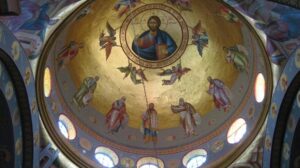 Christ. The Church is an “epiphany” of Heaven, which transcends time and space, encompasses earth and Heaven, where we are allowed by God’s grace to participate in the life of all the saints and angels and even God Himself. They are part of our life, and our life is intermingled theirs. This is not high theology; this is the day by day experience of Orthodox people. For those who have eyes to see and ear to hear, it is most clearly shown and experienced at our Sunday Divine Liturgy.
Christ. The Church is an “epiphany” of Heaven, which transcends time and space, encompasses earth and Heaven, where we are allowed by God’s grace to participate in the life of all the saints and angels and even God Himself. They are part of our life, and our life is intermingled theirs. This is not high theology; this is the day by day experience of Orthodox people. For those who have eyes to see and ear to hear, it is most clearly shown and experienced at our Sunday Divine Liturgy.
The Church is one.
Christ prayed on Holy Thursday night that His Church would be united. And so it is!
How can I say that? – considering that Christianity is split into more than a thousand different pieces.
That’s what brought me to the Orthodox Church.
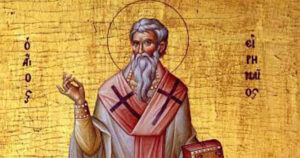 Sixty years ago I was utterly confused by the multiplicity of denominations, all claiming they were the Church, had the truth. I already had begun my search for the true and original Church, and was reading the early Fathers. In his book Against Heresies Saint Irenaeus was dealing with a situation similar to our own. There were many groups claiming to be true Christianity. How was a person to know which was the right one? I figured Irenaeus had the “scoop” on this, since he had been taught and trained by Saint Polycarp who had been a disciple of Saint John the Apostle and Theplogian, Jesus’ closest friend.
Sixty years ago I was utterly confused by the multiplicity of denominations, all claiming they were the Church, had the truth. I already had begun my search for the true and original Church, and was reading the early Fathers. In his book Against Heresies Saint Irenaeus was dealing with a situation similar to our own. There were many groups claiming to be true Christianity. How was a person to know which was the right one? I figured Irenaeus had the “scoop” on this, since he had been taught and trained by Saint Polycarp who had been a disciple of Saint John the Apostle and Theplogian, Jesus’ closest friend.
To sum it up, Saint Irenaeus described two marks of the true and authentic Church. 1 From one end of the earth to the other, exactly the same Faith is taught in every church. 2 Each individual church is connected visibly to the Apostles through a succession of Bishops/Heirarchs which can be traced back to the Apostles themselves.
I thought sarcastically: “Great! There’s nothing like that left on the face of the earth today.” Well, there was, and there is, but it took me twenty five years to discover the Orthodox Church. Despite the fact that we have no Pope at the top to tell us what to do, despite our almost complete lack of effective organization, despite the fact that we sometimes fight like cats and dogs (like right now)… The same Faith is taught in every Orthodox church in the world. Every Orthodox church is under the care of a Bishop whose “lineage” can be traced back through history directly to one or another of the Twelve Apostles. This is what Saint Irenaeus was talking about.
According to the Creed, this unity is one of signs of The Church.
Do today’s baleful divisions among Orthodox Christians “unchurch” the Orthodox Church? No. Despite all, we remain united in the Faith.
Are we “un-churching” all the denominations, all other Christians? No. As Bishop Kallistos wrote: We know where the true Church is, but we don’t know where it isn’t. There surely are many who are not Orthodox but who are very close to Orthodoxy, or who by their intentions… well, let me put it like this: In my many years of seeking the Truth, seeking God’s original and authentic Church, I trust He honored my intentions and looked on me as part of it.
The Church is Catholic.
As Father Hopko succinctly put it, the Greek word Catholic “refers to quality, not quantity”.
The word “Catholic” derives from the Greek “olos” / “όλος”, meaning “all” or “whole”. As originally used in the Church, it referred to the “whole Faith”, “all the Faith”, “holding the fullness of the Faith”. One Anglican Archbishop of Canterbury (!) put it beautifully: “We hold only the Catholic Faith of the Catholic Church, with nothing added, nothing subtracted.” (I have some hesitations about the accuracy of what he said, but God bless and reward that good man’s intention.)
“Catholic” originally did not mean all Christians throughout the world. It doesn’t even refer to all Orthodox Christians throughout the world.
“Catholic” originally did not mean “Roman Catholic”. Roman Catholics were Catholic Christians who were under the authority of the Bishop of Rome. (“Is the Pope Catholic”? Oh, let’s not get into that now.)
So, the big question: Is there salvation outside the One, Holy, Catholic Church on earth? Two answers: No, but Yes.
No, because salvation is found only in God, and Christ is God, and the Church is the Body of Christ on earth. To be saved (in this life and in the next) we must be united with Jesus Christ.
Yes, because (as I said before) there may be well be many, of whom we don’t know, who are united with Christ and in God’s sight are being saved. For example, read Matthew 25:31-46. Love is most important, more important than which church you belong to, or even which religion you belong to. Orthodox doctrine is that love is even more important than doctrine!
Or to come at it the other way, do we think being Orthodox guarantees salvation? You’ve got to be kidding. “Many who are first shall be last.”
So if it is possible be saved outside the visible Church, why should we bother trying to find it and become part of it? Because it is true. Are we seeking the truth, the true Faith? The Church is the “pillar and bulwark of the truth”. 1 Timothy 3.15 That’s why.
The Church is Apostolic.
This means three things:
1 The Church holds firmly to the Faith of the Apostles. Where did the Creed come from? It is a summary of the clear teaching of the Apostles, who received it from Jesus Christ Himself, as recorded in the Holy Scriptures.
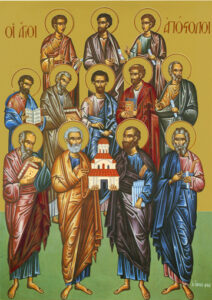 2 The Church, as we said before, has Apostolic Succession. Every bishop in the Orthodox Church can trace his “lineage” in an unbroken succesion back to one or another of the Twelve Apostles. However, keep in mind that a succession of Bishops without a succession of Apostolic Faith would mean nothing. The two must work together, each a guarantor of the other.
2 The Church, as we said before, has Apostolic Succession. Every bishop in the Orthodox Church can trace his “lineage” in an unbroken succesion back to one or another of the Twelve Apostles. However, keep in mind that a succession of Bishops without a succession of Apostolic Faith would mean nothing. The two must work together, each a guarantor of the other.
Greek, late 20th c, by Archimandrite Galaktikon
3 The Church has been given the mission of the Apostles. In Greek the word “apostle” / ἀπόστολος means literally one who is “sent out”. We are still sent out by our Lord Jesus Christ to bring His Good News to the world. Matthew 28:19
“. . . [God] has put all things under His feet and has made Him the head over all things for the Church, which is His body, the fullness of Him who fills all in all. . . for through Him we . . . have access in one Spirit, to the Father. So then you are no longer strangers and sojourners, but you are fellow-citizens with the saints and members of the household of God, built upon the foundation of the apostles and prophets, Christ Jesus Himself being the cornerstone, in whom the whole structure is joined together and grows into a holy temple in the Lord; in whom you also are built into it for a dwelling place of God in the Spirit. Ephesians 1.21–23; 5.25–32
I confess one baptism for the forgiveness of sins. I look for the resurrection of the dead, and the life of the age to come. Amen.
 Why are no other sacraments mentioned? Because, remember, the Creed was originally said by those about to be baptized, as the sign of their commitment to the Faith of the Church.
Why are no other sacraments mentioned? Because, remember, the Creed was originally said by those about to be baptized, as the sign of their commitment to the Faith of the Church.
from a Roman catacomb
Why “forgiveness of sins”? Because at the time the Creed was written, the Church was no longer being persecuted, and people of all sorts and backgrounds were pouring into it. They formerly had been pagans, had grown up with pagan standards of morality (and immorality).
The Greek word (which in English we translate as “sin” *) is ἁμαρτία / amartia. It means simply “off the mark”. “Forgiveness of sins” means simply “to take away their being off the mark” – that is, get them back “on the mark” of loving God and loving their neighbors. Holy Baptism was the first step in this process, where they washed away their old ways.
- which in English is kind of a loaded word, implying personal culpability and guilt
The Resurrection of the Dead, and the Life of the Age to Come.
Forgive me, but I’m running out of both time and space, so this must be brief. You get to research this on your own.
Among the gifts of Holy Baptism are:
1 Everlasting life. That’s the quantity. It continues forever. However, we can imagine kinds of life which we would not want to continue forever.
2 Eternal life. That’s the quality – sharing in the blessed, holy life of God, of Christ our God and the Church on high.
Christ promised us not only the bodiless life which we all will experience after death – whatever that means, and I don’t, but at my age I’ll find out before very long. He also promised the reunion of soul and body in the Resurrection of the Body. .
Read:
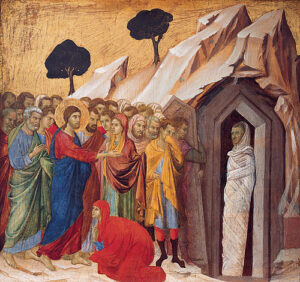 1 John 5:21ff, the raising of Lazarus.
1 John 5:21ff, the raising of Lazarus.
Duccio di Buoninsegna, 1311
2 The accounts of Christ’s Resurrection. His risen Body is a sign of what we will be like when “we shall be like Him.”
3 The Revelation of John chapters 21 and 22, which describe, chiefly in symbolic language, things which we cannot yet describe *, but which are coming. Throughout the Scriptures there is the promise of a new Age, the Age of the Kingdom of Christ our God. This world will not continue as it is forever. There will come a time when Heaven and earth will be one, and God’s will “will be done on earth as it is in Heaven”. If we choose, we can share in that new life, that new Age, beginning even now.
- …which is why the Church has no icons of the New Age
_______________________________
Do you feel, as I do, that there’s more in the Creed than we can possibly take in? Here’s the secret to understanding the Creed:
Notice first where the Creed is placed in the Orthodox Divine Liturgy.
Among Western Christians the Creed comes after the Scripture readings (and homily) as an intellectual response to what has been heard.
However, in the Orthodox Liturgy, the Creed is said later, after the Great Entrance, as an introduction to the Anaphora, the blessing of the holy Bread and Wine. For us the Creed is connected to the manifestation of God.
Here is how the Deacon or Priest introduces the Creed: “Let us love one another, that with oneness of mind we may confess:” and then the Creed follows.
The key to understanding the meaning of the Creed is not chiefly by the mind but rather by the heart (which in Orthodox terms means the soul, our deepest inner being) and also by the hands, remembering “if you love Me, keep my commands”.
“Though I… understand all mysteries and all knowledge… but have no love, I am nothing”. I Corinthians 13: 1, 3. Love for each other opens our hearts and minds to understand and know God, the Holy Scriptures and therefore the Creed.
So have our three weeks looking (however superficially) at the Creed been pointless? Of course not. Intellectual understanding is important. God knows that the holy writers of the Orthodox Church have produced a seemingly endless stream of words.
But, brothers and sisters, we can study theology, study the Scriptures, study the Creed all day seven days a week and say it in church every Sunday – but if we don’t have love, we’re never going to know what it’s really all about.
Next Week: a Twentieth Century Saint – Jonah of Manchuria
Week after Next: Saint James of Jerusalem, Brother of the Lord and First Bishop of Jerusalem